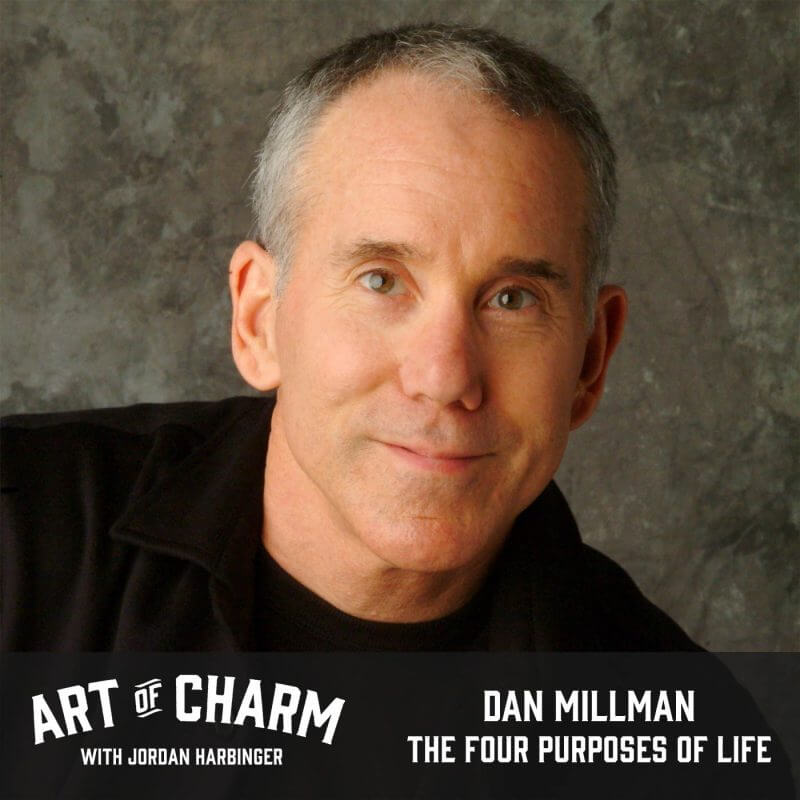Dan Millman (@pwdan) revisits the show to talk about his newly updated book The Four Purposes of Life: Finding Meaning and Direction in a Changing World.
The Cheat Sheet:
- Earth/life is a school and daily life is your classroom.
- Career and calling are two different things (and don’t necessarily need to be merged).
- Learn why we’re here to fulfill four fundamental purposes in life — and what they are).
- Find direction in life when faced with seemingly difficult challenges.
- Clarify your hidden calling with Dan’s Life Purpose Calculator.
- And so much more…
[aoc-subscribe]
These days we’re all preoccupied with not only our personal challenges but the ongoing economic crisis, natural disasters, political instability, celebrity scandals, and more. It seems like we’re all going a little crazy and feeling a little lost; it’s hard to know where to turn and how do discern what is best for our life, our future, and how to step outside of the fear and chaos to find happiness, purpose, and joy.
In The Four Purposes of Life: Finding Meaning and Direction in a Changing World, author and teacher Dan Millman addresses life’s fundamental questions: Why am I here? What am I meant to do? What is my purpose? As a pioneer in the human potential movement, he has helped millions find purpose and joy in all aspects of their lives. Dan revisits The Art of Charm for episode 508 to discuss what we can do to answer the fundamental questions and find our way ahead.
More About This Show
Author and teacher Dan Millman has been writing books for over 30 years — his most famous so far being Way of the Peaceful Warrior: A Book That Changes Lives (which we discussed with him in episode 407). This time, he’s here to talk about the new edition of his book The Four Purposes of Life: Finding Meaning and Direction in a Changing World.
One of the first things you might notice upon meeting Dan is that he’s in the kind of shape people decades younger envy. He attributes this just as much to physical exercise as the mental exercise of writing books — which he does frequently. Even if you’re not a writer, he recommends journaling for anyone as a way of keeping mentally sharp and remembering the events of your life as they unfold.
“Even though memories may not reflect exactly what happened — it’s from our perspective — we remember through a filter just as we perceive life through a filter, day to day, moment to moment…and we also have this ability to project our imagination into the future. So it’s not as if there’s something bad about looking back, thinking about what we call the past; we’re looking ahead to what we call the future.
“All this information, all these ideas of living in the present are really saying it may be more effective and functional to handle what’s in front of us and not worry as much about the past or the future. But still, that isn’t to say it isn’t valuable to look back.”
It doesn’t matter whether you’re writing your journals in longhand or speaking your thoughts into a recording device. Dan says our stories are unique to us and we shouldn’t keep them to ourselves. “In a way, our lives are like a novel being written. We never know what the next chapter’s going to be. And we’re characters in that novel. And I like to look at my life that way.”
The Four Purposes of Life
“We have to consider that, without a destination in mind, there is no journey,” says Dan. “We just wander around. To our point A, where we are now, everyone needs a point B. I believe we’re hard-wired purpose-seekers…goal-seekers. It gives us motion in life. In fact, one could define a good life, or a successful life as one that is moving toward a meaningful or worthwhile purpose for them — not getting anywhere, but moving toward a purpose.”
In writing The Four Purposes of Life, Dan could have easily drawn them out into six or more, but he thought it was fitting to have four points — like four directions on a compass, or four seasons in a year — to parallel these purposes.
Learning Life’s Lessons
Not only do we learn from our life experiences; Dan posits that life is a perfect school, and daily life is our classroom. He doesn’t see people reading his books — or any books — as essential for learning the lessons of life, but he says that “a good reminder may give us a lens to help us see life more clearly and learn the lessons of everyday life with a little more grace and a little less pain — and maybe save us some time on the journey.”
Dan lays out 12 courses — or gateways — in the school of life (and explains them in greater detail on the show):
- Discovering Your Worth
- Reclaiming Your Will
- Energizing Your Body
- Managing Your Money
- Taming Your Mind
- Trusting Your Intuition
- Accepting Your Emotions
- Facing Your Fears
- Illuminating Your Shadow
- Embracing Your Sexuality
- Awakening Your Heart
- Serving Your World
Finding Our Career and Calling
“The reason it’s important to understand the difference between career and calling,” says Dan, “is many of us get idealistic advice — such as ‘Do what you love and the money will follow.’ Unless it doesn’t! Sometimes, people do what they love and the money doesn’t follow. It’s not a magical formulation. Our career, by definition, is what we do to produce an income. What could be more natural? That is, human beings, since human beings were interacting on Earth, were trading and bartering their different talents and having commerce with one another.
“Over time, we had money as an intermediary. But we need to produce an income to support ourselves and our family. So we may love our work. We may get a lot of perks from it, find it meaningful and so on. But if we weren’t getting paid anything to do it, we’d probably have to find something else. So that’s what a career is about — whether we call it a job, a profession, a gig. Whatever.
“Whereas our calling, that by definition is what we love. We may not even know why we love it. Maybe it’s a hobby. A sport. A game. A craft. Playing cards. It’s something we do not necessarily focused on income. It’s just something we love to do. That’s very important, too. And the reason it’s important to understand is because many starving artists out there feel like they don’t want to ‘sell out.’ They need to practice their guitar all day, for example. Whereas if they got a day job, they might achieve some independence, move out of their parents’ basement, and that may stabilize their life and allow them — in their discretionary time — to pursue their calling rather than insist it be full time.
“On the other end of the spectrum, there are people who I know who only value what produces an income and they feel like they’re wasting their time spending time on things that don’t produce an income, so they may have abandoned a calling or a hobby or something that gives them joy because they can’t justify it.
“So it’s important to appreciate both career and calling.”
He points out that you don’t have to love your career, but you shouldn’t let a calling impede you from pursuing gainful employment. If you’re lucky, sometimes you can combine a career and a calling.
Listen to this episode of the Art of Charm in its entirety to hear Dan delve a little deeper into the separation between career and calling. The Four Purposes of Life: Finding Meaning and Direction in a Changing World is available now, where you can read more about the first two purposes and the remaining two: Discovering Life’s Path and Attending to the Arising Moment.
THANKS, DAN MILLMAN!
Resources from this episode:
- The Four Purposes of Life: Finding Meaning and Direction in a Changing World by Dan Millman
- Dan Millman | Way of the Peaceful Warrior (Episode 407) (Dan’s previous appearance at AoC)
- Dan Millman’s website
- Dan Millman on Facebook
- Dan Millman on Twitter
You’ll Also Like:
On your phone? Click here to write us a well-deserved iTunes review and help us outrank the riffraff!




